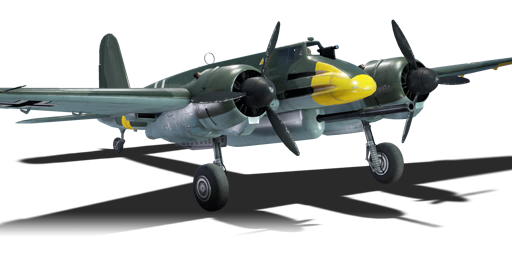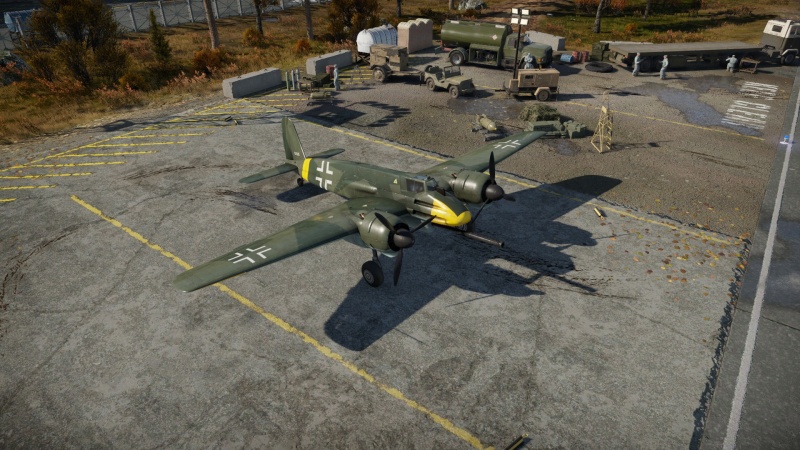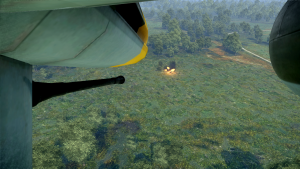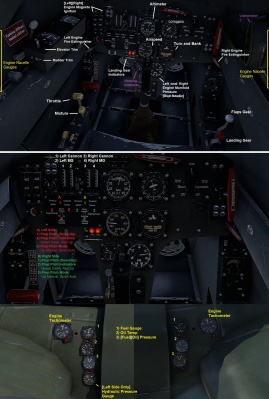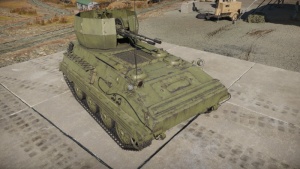Difference between revisions of "Hs 129 B-3"
(Made the usage in battles even more detailed.) (Tag: Visual edit) |
(→See also) |
||
| (5 intermediate revisions by 4 users not shown) | |||
| Line 13: | Line 13: | ||
The '''{{Specs|name}}''' is a rank {{Specs|rank}} German strike aircraft {{Battle-rating}}. It was introduced in [[Update 1.37]]. | The '''{{Specs|name}}''' is a rank {{Specs|rank}} German strike aircraft {{Battle-rating}}. It was introduced in [[Update 1.37]]. | ||
| − | The Hs 129 is | + | The Hs 129 is one of the most powerful aircraft in terms of its cannon, although the vehicle is dedicated to ground attack only. However, many players often use its 75 mm armament to take out larger and generally more bulky planes, like bombers. Moreover, the Hs 129 only has 13 rounds but it is not to worry, as they all are very powerful, along with the wide variety of shell types that this aircraft holds, including explosive shells, you will infrequently find yourself having to fire multiple times. In addition to the deadly cannon the Hs 129 is also mounted with two 7.92 mm LMGs, these smaller guns hold much more ammunition compared to the larger cannon making it a backup or second option for smaller and less armoured targets. The 75 mm cannon alone makes the Hs 129 single-handedly one of the most deadly aircraft let alone the two 7.92 mm LMGs. However, this plane has many drawbacks. The two engines mounted on its wings lack power causing the Hs 129 to often lack power, energy, and speed along with an increased turn time in battles, yet it is not to worry as the Hs 129 rarely finds its way into dog fights and is usually used for air to ground combat and if not, it is able to quickly assassinate other air targets using its lethal cannon. The Hs 129 is heavily armoured and can withstand many rounds from opposing vehicles allowing it to have a very broad window to escape foes or return fire. |
| − | |||
| − | |||
== General info == | == General info == | ||
| Line 105: | Line 103: | ||
== Armaments == | == Armaments == | ||
{{Specs-Avia-Armaments}} | {{Specs-Avia-Armaments}} | ||
| − | [[File:Hs-129 B-3 destroying a ground vehicle.png|thumb|Hs | + | [[File:Hs-129 B-3 destroying a ground vehicle.png|thumb|Hs 129 B-3 destroying a ground vehicle with its 75 mm BK 7.5 cannon]] |
=== Offensive armament === | === Offensive armament === | ||
{{Specs-Avia-Offensive}} | {{Specs-Avia-Offensive}} | ||
| Line 116: | Line 114: | ||
* 2 x 7.92 mm MG 17 machine guns, cheek-mounted (1,000 rpg = 2,000 total) | * 2 x 7.92 mm MG 17 machine guns, cheek-mounted (1,000 rpg = 2,000 total) | ||
| − | The two machine guns are arranged on each side of the fuselage. | + | The two machine guns are arranged on each side of the fuselage. The 75 mm cannon is mounted to the underside of the fuselage. When aiming do not use the crosshair, instead, to be more precise with your shots, take the diameter of the aiming circle and put the length under the circle. This should provide the most accurate shot as that spot is a rough estimation of where your shot will land. |
== Usage in battles == | == Usage in battles == | ||
| Line 122: | Line 120: | ||
[[File:Cockpit_Hs129B.jpg|x400px|thumbnail|right|The Hs 129 B's instrument panel.]] | [[File:Cockpit_Hs129B.jpg|x400px|thumbnail|right|The Hs 129 B's instrument panel.]] | ||
| − | The Hs 129 B-3 is a German aircraft that was primarily designed to take out ground targets. Its remarkable ability to destroy most mission-relevant ground targets makes it a valuable asset in battle. With its | + | The Hs 129 B-3 is a German aircraft that was primarily designed to take out ground targets. Its remarkable ability to destroy most mission-relevant ground targets makes it a valuable asset in battle. With its armour-piercing ammunition, the Hs 129 B-3 can take out tanks of all sorts and light pillboxes with just one hit. Its arsenal of 13 shells available can make a single Hs 129 B-3 a game-changing aircraft, proving to be a formidable weapon against ground targets. |
| − | However, the Hs 129 has major drawbacks. Its engines are relatively weak, resulting in poor top speed, acceleration, and climb rate, making it perform poorly in air combat. The nearly one-ton weight of its | + | However, the Hs 129 has major drawbacks. Its engines are relatively weak, resulting in poor top speed, acceleration, and climb rate, making it perform poorly in air combat. The nearly one-ton weight of its armour also adds to its sluggishness and makes it vulnerable to attacks from enemy fighters. Nonetheless, some enemy pilots may underestimate the Hs 129 and overshoot it after a tight turn, giving the Hs 129 pilot a moderate chance of defending themselves. |
| − | When engaging in simulator battles, it is advisable to climb to at least 600 | + | When engaging in simulator battles, it is advisable to climb to at least 600 m, level, and build speed (energy) before turning and returning for another attack. Additionally, when spawning, it is still recommended to climb to 1,000 m above the ground and use the scope to spot enemy ground vehicles in simulator battles. If there are potential enemies in the area, losing altitude and flying away from the enemy to take a different path is also a sound strategy. |
One must exercise patience when aiming in a dive attack. It is essential to pull up and try again since the AI tanks will not move, and one must aim precisely for maximum efficiency. The use of 'universal belts' is recommended to assist in aiming the main tank gun, and tracers should be avoided. It is crucial to remember that the plane's success depends on the virtue of patience. | One must exercise patience when aiming in a dive attack. It is essential to pull up and try again since the AI tanks will not move, and one must aim precisely for maximum efficiency. The use of 'universal belts' is recommended to assist in aiming the main tank gun, and tracers should be avoided. It is crucial to remember that the plane's success depends on the virtue of patience. | ||
| Line 134: | Line 132: | ||
'''Enemies worth noting:''' | '''Enemies worth noting:''' | ||
| − | [[Yak-2 KABB]] | + | * [[Yak-2 KABB]] - Do not think that the {{PAGENAME}} can confidently outmanoeuvre this plane just because it is twin-engined. The Yak-2 has an amazing turn rate for a heavy fighter, thus the {{PAGENAME}} must avoid turning with it, if not dogfighting with it in general. It bears a pair of ShVAK cannons that can easily damage vital parts like engine or cooling systems. It has a green camouflage, greatly resembling an Me 410 but with an H-tail like a Bf 110's. |
| − | + | [[File:ZSD63.jpg|thumb|ZSD63]] | |
| − | [[ZSD63]] | + | * [[ZSD63]] - A dangerous SPAA to go up against in Tank Realistic Battles. Though it is hard to identify specific SPAA vehicles on the ground (especially when they are shooting tracers at the plane), if a ZSD63 is identified, avoid it at all costs and do not attempt head-ons with it, ever. It can easily snap a wing off by casually putting a short burst in the {{PAGENAME}}'s flight path. Don't even get close to it unless it is busy shooting someone else. Even the {{PAGENAME}}'s mighty 75 mm cannon cannot effectively damage it as its hull is overall quite empty, causing your shells to do little to no damage. Some identifying features of the ZSD63 is its rather boxy and tall hull with a geometric turret sitting at the back, slightly similar to a Wirbelwind's. The firing manner is also distinctive: the sound and green tracers are very rapid, much like a buzz saw, but then it will remain silent for half a minute reloading. Note that an experienced ZSD player will hold its fire or shoot in single salvos with long halts between, making it look like it's reloading. |
=== Manual Engine Control === | === Manual Engine Control === | ||
| Line 201: | Line 199: | ||
* ''reference to the series of the aircraft;'' | * ''reference to the series of the aircraft;'' | ||
* ''links to approximate analogues of other nations and research trees.'' --> | * ''links to approximate analogues of other nations and research trees.'' --> | ||
| + | ;Related development | ||
| + | * [[Hs 129 (Family)]] | ||
;Similar aircraft fitted with a large-calibre gun | ;Similar aircraft fitted with a large-calibre gun | ||
| − | |||
* [[PBJ-1H]] | * [[PBJ-1H]] | ||
* [[XA-38]] | * [[XA-38]] | ||
Latest revision as of 15:46, 5 July 2024
| This page is about the German strike aircraft Hs 129 B-3. For other versions, see Hs 129 (Family). |
Contents
Description
The Hs 129 B-3 is a rank II German strike aircraft with a battle rating of 2.0 (AB/RB) and 3.0 (SB). It was introduced in Update 1.37.
The Hs 129 is one of the most powerful aircraft in terms of its cannon, although the vehicle is dedicated to ground attack only. However, many players often use its 75 mm armament to take out larger and generally more bulky planes, like bombers. Moreover, the Hs 129 only has 13 rounds but it is not to worry, as they all are very powerful, along with the wide variety of shell types that this aircraft holds, including explosive shells, you will infrequently find yourself having to fire multiple times. In addition to the deadly cannon the Hs 129 is also mounted with two 7.92 mm LMGs, these smaller guns hold much more ammunition compared to the larger cannon making it a backup or second option for smaller and less armoured targets. The 75 mm cannon alone makes the Hs 129 single-handedly one of the most deadly aircraft let alone the two 7.92 mm LMGs. However, this plane has many drawbacks. The two engines mounted on its wings lack power causing the Hs 129 to often lack power, energy, and speed along with an increased turn time in battles, yet it is not to worry as the Hs 129 rarely finds its way into dog fights and is usually used for air to ground combat and if not, it is able to quickly assassinate other air targets using its lethal cannon. The Hs 129 is heavily armoured and can withstand many rounds from opposing vehicles allowing it to have a very broad window to escape foes or return fire.
General info
Flight performance
| Characteristics | Max Speed (km/h at 3,550 m) |
Max altitude (metres) |
Turn time (seconds) |
Rate of climb (metres/second) |
Take-off run (metres) | |||
|---|---|---|---|---|---|---|---|---|
| AB | RB | AB | RB | AB | RB | |||
| Stock | 421 | 404 | 7500 | 29.4 | 31.3 | 5.9 | 5.9 | 331 |
| Upgraded | 466 | 439 | 26.5 | 27.9 | 11.2 | 8.3 | ||
Details
| Features | ||||
|---|---|---|---|---|
| Combat flaps | Take-off flaps | Landing flaps | Air brakes | Arrestor gear |
| ✓ | ✓ | ✓ | X | X |
| Limits | ||||||
|---|---|---|---|---|---|---|
| Wings (km/h) | Gear (km/h) | Flaps (km/h) | Max Static G | |||
| Combat | Take-off | Landing | + | - | ||
| 0 | 295 | 287 | 252 | 190 | ~10 | ~6 |
| Optimal velocities (km/h) | |||
|---|---|---|---|
| Ailerons | Rudder | Elevators | Radiator |
| < 320 | < 320 | < 300 | > 280 |
| Compressor (RB/SB) | ||
|---|---|---|
| Setting 1 | ||
| Optimal altitude | 100% Engine power | WEP Engine power |
| 3,550 m | 1,300 hp | 1,530 hp |
Survivability and armour
- 5 mm Steel - Oil cooler covers
- 5 mm Steel - Lower engine cowl protection
- 2 mm Steel - Cockpit side plates
- 12 mm Steel - Cockpit back plate, floor, and front plates
- 75 mm Bulletproof glass
Modifications and economy
Armaments
Offensive armament
The Hs 129 B-3 is armed with:
- 1 x 75 mm BK 7.5 cannon, chin-mounted (13 rpg)
- 2 x 7.92 mm MG 17 machine guns, cheek-mounted (1,000 rpg = 2,000 total)
The two machine guns are arranged on each side of the fuselage. The 75 mm cannon is mounted to the underside of the fuselage. When aiming do not use the crosshair, instead, to be more precise with your shots, take the diameter of the aiming circle and put the length under the circle. This should provide the most accurate shot as that spot is a rough estimation of where your shot will land.
Usage in battles
The Hs 129 B-3 is a German aircraft that was primarily designed to take out ground targets. Its remarkable ability to destroy most mission-relevant ground targets makes it a valuable asset in battle. With its armour-piercing ammunition, the Hs 129 B-3 can take out tanks of all sorts and light pillboxes with just one hit. Its arsenal of 13 shells available can make a single Hs 129 B-3 a game-changing aircraft, proving to be a formidable weapon against ground targets.
However, the Hs 129 has major drawbacks. Its engines are relatively weak, resulting in poor top speed, acceleration, and climb rate, making it perform poorly in air combat. The nearly one-ton weight of its armour also adds to its sluggishness and makes it vulnerable to attacks from enemy fighters. Nonetheless, some enemy pilots may underestimate the Hs 129 and overshoot it after a tight turn, giving the Hs 129 pilot a moderate chance of defending themselves.
When engaging in simulator battles, it is advisable to climb to at least 600 m, level, and build speed (energy) before turning and returning for another attack. Additionally, when spawning, it is still recommended to climb to 1,000 m above the ground and use the scope to spot enemy ground vehicles in simulator battles. If there are potential enemies in the area, losing altitude and flying away from the enemy to take a different path is also a sound strategy.
One must exercise patience when aiming in a dive attack. It is essential to pull up and try again since the AI tanks will not move, and one must aim precisely for maximum efficiency. The use of 'universal belts' is recommended to assist in aiming the main tank gun, and tracers should be avoided. It is crucial to remember that the plane's success depends on the virtue of patience.
Despite its apparent weaknesses, the Hs 129 B-3 is designed to destroy objectives, making it a valuable asset in battles. The plane may appear weak, but every tool in its arsenal has a specific purpose, and its primary focus is on taking out ground targets. Thus, when used effectively, the Hs 129 B-3 can prove to be a force to be reckoned with in battle.
Enemies worth noting:
- Yak-2 KABB - Do not think that the Hs 129 B-3 can confidently outmanoeuvre this plane just because it is twin-engined. The Yak-2 has an amazing turn rate for a heavy fighter, thus the Hs 129 B-3 must avoid turning with it, if not dogfighting with it in general. It bears a pair of ShVAK cannons that can easily damage vital parts like engine or cooling systems. It has a green camouflage, greatly resembling an Me 410 but with an H-tail like a Bf 110's.
- ZSD63 - A dangerous SPAA to go up against in Tank Realistic Battles. Though it is hard to identify specific SPAA vehicles on the ground (especially when they are shooting tracers at the plane), if a ZSD63 is identified, avoid it at all costs and do not attempt head-ons with it, ever. It can easily snap a wing off by casually putting a short burst in the Hs 129 B-3's flight path. Don't even get close to it unless it is busy shooting someone else. Even the Hs 129 B-3's mighty 75 mm cannon cannot effectively damage it as its hull is overall quite empty, causing your shells to do little to no damage. Some identifying features of the ZSD63 is its rather boxy and tall hull with a geometric turret sitting at the back, slightly similar to a Wirbelwind's. The firing manner is also distinctive: the sound and green tracers are very rapid, much like a buzz saw, but then it will remain silent for half a minute reloading. Note that an experienced ZSD player will hold its fire or shoot in single salvos with long halts between, making it look like it's reloading.
Manual Engine Control
| MEC elements | ||||||
|---|---|---|---|---|---|---|
| Mixer | Pitch | Radiator | Supercharger | Turbocharger | ||
| Oil | Water | Type | ||||
| Not controllable | Controllable Not auto controlled |
Controllable Not auto controlled |
Not controllable Not auto controlled |
Separate | Not controllable 1 gear |
Not controllable |
Pros and cons
Pros:
- The combination of the 7.92 mm machine guns and the 75 mm anti-tank gun can make short work of armoured columns
- Can be quite profitable in Air RB when used right, as destroying tanks nets you quite a high score
- A shot from the 75 mm gun can tear an aircraft apart when firing High Explosive rounds
- Extremely effective in tank realistic battles with air superiority. The 75 mm can take out even the most heavily armoured Allied tanks
- The 7.92 mm machine guns allow for engaging unarmoured targets without wasting 75 mm ammunition
- Can take a fair amount of punishment
- Quite a stable gun platform
- Default ammunition for 75 mm gun is made up of only AP shells, unlike similar aircraft
Cons:
- Extremely slow from underpowered engines
- Terrible climb rate
- Not particularly manoeuvrable
- Poor energy retention
- Damage to engines can lose enough power to the extent that the plane simply falls out of the sky
- No defensive armament translates to a "sitting duck" in some combat situations, especially without friendly fighters in the air
- Cockpit has very thin armour that leaves pilot vulnerable to most enemy projectiles
- The gun has large horizontal drop-off (if you dive at a higher angle, the shots will land nearer to the crosshair)
- 75 mm cannon is rather inaccurate when stock
- Has only 13 rounds for the 75 mm cannon
History
Produced in 1944, the B-3 variant of the Henschel Hs 129 was installed with the 7.5 cm BK 7,5 cannon, a lighter version of the PaK 40 which already been tested on the Junkers Ju 88. The 7.5 cm BK 7,5 had 12 rounds in a rotary magazine. The gun was fully automatic, with a newly designed hydraulic recoil dampening system and a more aerodynamic muzzle brake. The gun pod had a circular port to let the cartridges eject after firing. The 7.5 cm BK 7,5 was the most powerful forward-firing weapon ever fitted to a production aircraft at the time. It can theatrically destroy any armoured target it found. Only 25 units of the Hs 129 B-3 were produced.
Media
- Skins
- Videos
See also
- Related development
- Similar aircraft fitted with a large-calibre gun
External links
| Henschel & Son Corporation (Henschel und Sohn Aktiengesellschaft) | |
|---|---|
| Attackers | Hs 129 B-2 · Hs 129 B-3 |
| Bombers | Hs 123 A-1 |
| Export | ␗Hs 123 A-1 |
| Hs 129 B-2 (Romania) · Hs 129 B-2 (Romania) | |
| Germany strike aircraft | |
|---|---|
| Messerschmitt | |
| Bf 110 | Bf 110 C-6 · Bf 110 C-7 · Bf 110 F-2 · Bf 110 G-2 · Bf 110 G-4 |
| Me 410 | Me 410 A-1 · Me 410 A-1/U4 · Me 410 B-1 · Me 410 B-2/U4 · Me 410 B-6/R3 |
| Dornier | |
| Do 335 | Do 335 A-0 · Do 335 A-1 · Do 335 B-2 |
| Focke-Wulf | |
| Fw 190 | Fw 190 F-8 |
| Heinkel | |
| He 219 | He 219 A-7 |
| Henschel | |
| Hs 129 | Hs 129 B-2 · Hs 129 B-2 (Romania) · Hs 129 B-3 |
| Junkers | |
| Ju 87 | Ju 87 G-1 · Ju 87 G-2 |
| Foreign: | |
| USSR | ▀IL-2 (1942) |


